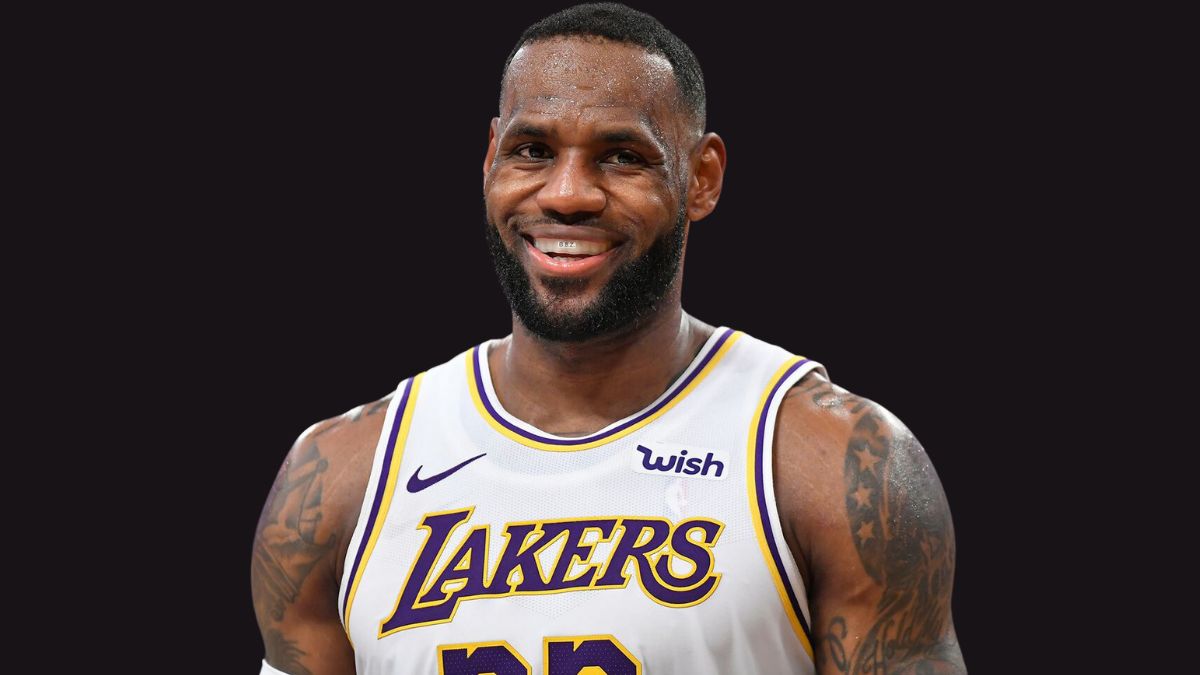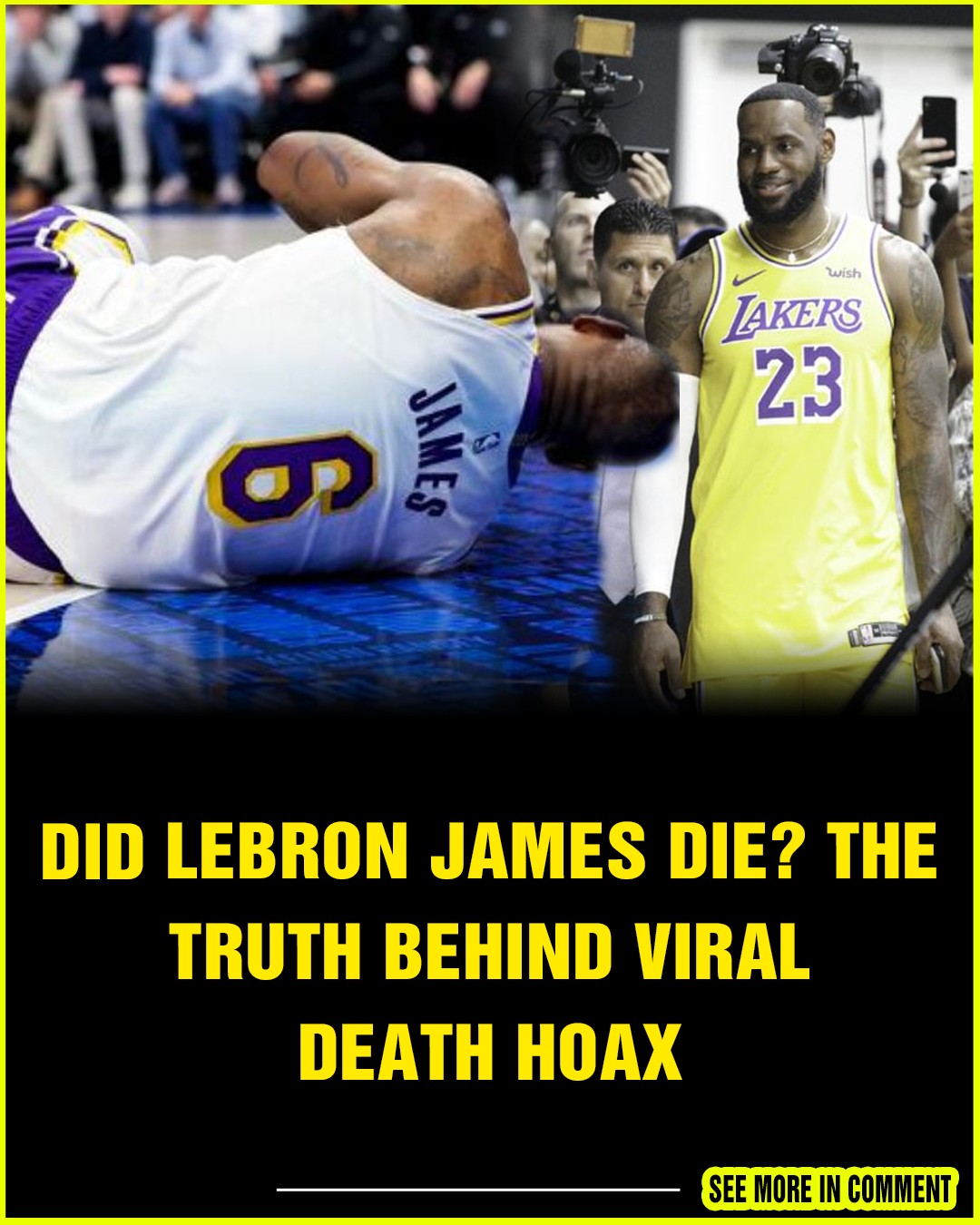Have you ever scrolled through social media and stumbled upon some wild rumors about your favorite celebrities? Well, if you're a LeBron James fan, you might have come across the question, "Did LeBron die?" Let's dive straight into this topic because it's not just about clearing up misconceptions; it's about understanding how fake news spreads like wildfire in today's digital age. So buckle up, because we're about to debunk some myths and set the record straight.
LeBron James is one of the most iconic figures in sports history, and with that level of fame comes a lot of attention—both good and bad. Over the years, there have been countless rumors circulating about him, ranging from personal life drama to career controversies. But none have been as shocking as the recent claims that LeBron has passed away. Spoiler alert: He's very much alive and kicking, but let's explore why these rumors exist and how they impact us.
Before we dive deeper, it's important to remember that in a world where information travels faster than ever, it's crucial to fact-check before believing everything you see online. The "LeBron death" rumor is just one example of how misinformation can spread like a virus. So, let's break it down step by step and figure out what's real and what's fake.
Table of Contents
- LeBron James: A Quick Biography
- Understanding the Rumors: Where Did They Come From?
- The Facts: Debunking the "Did LeBron Die" Hoax
- The Role of Media in Spreading Misinformation
- The Impact of Fake News on Celebrities
- How Fans Can Help Stop the Spread
- Statistics on Fake News in the Digital Age
- Building Trust in a World of Misinformation
- Conclusion: Stay Informed, Stay Smart
LeBron James: A Quick Biography
Before we get into the nitty-gritty of the "LeBron death" rumors, let's take a moment to appreciate the man behind the legend. LeBron James isn't just any athlete—he's a cultural icon, a business mogul, and a role model for millions around the world. Here's a quick rundown of his life and career:
Early Life and Career
LeBron was born on December 30, 1984, in Akron, Ohio. Growing up, he faced his fair share of challenges, but his passion for basketball quickly became evident. By the time he was in high school, LeBron was already making headlines, and his nickname "King James" stuck because of his incredible talent and leadership on the court.
Biodata
| Full Name | LeBron Raymone James |
|---|---|
| Date of Birth | December 30, 1984 |
| Place of Birth | Akron, Ohio, USA |
| Height | 6 ft 9 in (2.06 m) |
| Weight | 250 lbs (113 kg) |
| Position | Small Forward / Power Forward |
LeBron's journey from a kid from Akron to one of the greatest basketball players of all time is nothing short of inspiring. But with great fame comes great responsibility—and sometimes, great misinformation.
Understanding the Rumors: Where Did They Come From?
So, how did the "Did LeBron die" rumor even start? Well, let's be real here—fake news has been around for ages, but the internet has given it a whole new platform to thrive. In this section, we'll explore the origins of the rumor and why people fall for it.
How Rumors Spread
Rumors about celebrities dying are not new. Think about it—how many times have you seen headlines claiming that someone like Elvis Presley or Britney Spears has passed away, only to find out later that it was completely false? The "LeBron death" rumor follows a similar pattern. Here's how it usually works:
- Social Media Echo Chambers: Platforms like Twitter and Instagram can amplify rumors quickly, especially if they're shared by influencers or bots.
- Clickbait Tactics: Some websites or individuals create sensational headlines to attract clicks, even if the information is false.
- Human Psychology: People tend to believe what they see or hear, especially if it comes from a source they trust. This makes it easy for misinformation to spread without verification.
It's like a game of telephone, but instead of whispers, it's viral posts and tweets. By the time the truth comes out, the damage is already done.
The Facts: Debunking the "Did LeBron Die" Hoax
Now that we know how rumors spread, let's talk about the facts. The short answer to "Did LeBron die?" is a big, fat NO. LeBron James is very much alive and continuing to dominate the basketball world. But how can we be sure?
Verifying the Truth
Here are a few ways to confirm that LeBron is still going strong:
- Recent Appearances: LeBron has been active on social media and has made numerous public appearances in the past few months. If you follow him on Instagram or Twitter, you'll see plenty of proof that he's alive and well.
- Official Statements: The Los Angeles Lakers, LeBron's current team, have issued statements confirming his status. If there were any truth to the rumors, the team would have made an official announcement.
- Fact-Checking Websites: Sites like Snopes and PolitiFact are great resources for verifying the accuracy of news stories. A quick search will show that the "LeBron death" claim is false.
At the end of the day, trust reliable sources and don't believe everything you read online. It's that simple.
The Role of Media in Spreading Misinformation
While social media plays a big role in spreading rumors, traditional media isn't always innocent either. In this section, we'll explore how the media can contribute to misinformation and what can be done to prevent it.
The Pressure to Break News
In today's fast-paced news cycle, journalists and media outlets are often under pressure to be the first to break a story. This can lead to mistakes, as facts aren't always verified before publication. For example, during major events like natural disasters or celebrity deaths, false reports can slip through the cracks.
However, responsible journalism involves fact-checking and holding sources accountable. By prioritizing accuracy over speed, media outlets can help combat the spread of misinformation.
The Impact of Fake News on Celebrities
Being a public figure comes with its own set of challenges, and fake news is one of them. In this section, we'll discuss how rumors like "Did LeBron die" affect celebrities and their fans.
Emotional Toll on Fans
Fans invest a lot of emotion into their favorite celebrities, and hearing false news about their death can be devastating. Imagine waking up to a headline claiming that one of your idols has passed away—it's enough to ruin your day. That's why it's important to verify information before reacting emotionally.
Damage to Reputation
For celebrities like LeBron, false rumors can damage their reputation and affect their career. Even if the truth comes out, the initial impact can linger. It's a reminder of how powerful—and dangerous—words can be in the digital age.
How Fans Can Help Stop the Spread
As fans, we have a responsibility to help stop the spread of misinformation. In this section, we'll provide practical tips for verifying news and staying informed.
Be a Critical Thinker
Here are a few things you can do to avoid falling for fake news:
- Check Multiple Sources: Don't rely on just one article or tweet. Look for confirmation from reputable sources.
- Verify Dates: Sometimes old news is recycled and presented as new. Always check the date of the article or post.
- Use Fact-Checking Tools: As mentioned earlier, websites like Snopes and PolitiFact can help you verify the accuracy of information.
By being more critical and thoughtful consumers of information, we can help create a more informed and trustworthy digital environment.
Statistics on Fake News in the Digital Age
To fully understand the scope of the problem, let's take a look at some statistics on fake news and its impact:
- 64% of Americans: Believe that fake news has caused confusion about basic facts.
- 59% of Fake News: Is shared on social media without the person even reading the article.
- 46% of People: Have admitted to sharing false information online.
These numbers highlight the need for greater awareness and education about the dangers of misinformation. It's not just about protecting celebrities like LeBron—it's about protecting ourselves and our communities.
Building Trust in a World of Misinformation
In a world where fake news seems to be everywhere, how can we rebuild trust in information? This section explores solutions and strategies for combating misinformation.
Education and Awareness
One of the most effective ways to fight misinformation is through education. Teaching people how to critically evaluate sources and verify information can go a long way in preventing the spread of fake news. Schools, media outlets, and even social media platforms can play a role in promoting digital literacy.
Accountability and Regulation
While freedom of speech is important, there also needs to be accountability for spreading false information. Governments and tech companies are starting to take steps to regulate content and hold bad actors accountable. However, finding the right balance between freedom and regulation is a ongoing challenge.
Conclusion: Stay Informed, Stay Smart
In conclusion, the "Did LeBron die" rumor is just one example of how misinformation can spread in today's digital age. While it's easy to get caught up in the drama, it's important to remember that not everything you see online is true. By being critical thinkers and responsible consumers of information, we can help combat the spread of fake news and protect the reputations of those we admire.
So, the next time you come across a shocking headline, take a moment to pause and verify the facts. And remember, LeBron James is still out there doing what he does best—dominating the court and inspiring millions around the world.
Got thoughts on this topic? Leave a comment below or share this article with your friends. Let's work together to create a more informed and trustworthy digital world!


